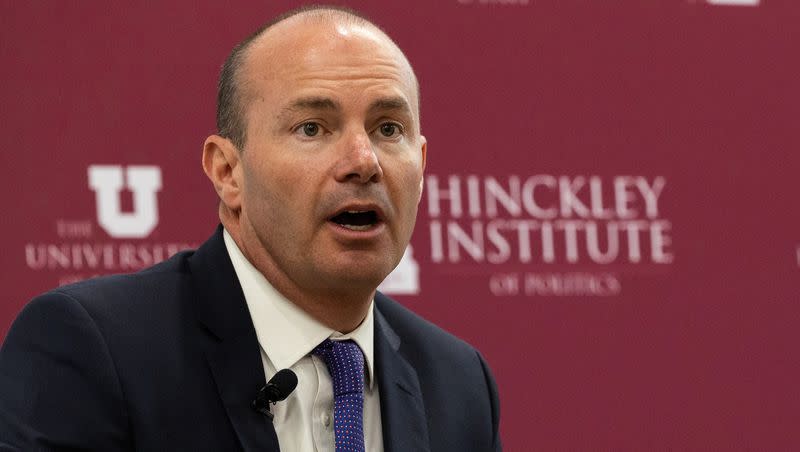Senate passes bill to avert government shutdown — Lee, Crapo, Risch vote ‘no’

- Oops!Something went wrong.Please try again later.
- Oops!Something went wrong.Please try again later.
The Senate authorized a short-term spending bill late Wednesday night to avert a government shutdown, over the objections of some Republicans, including Sen. Mike Lee of Utah and Sens. Mike Crapo and James Risch of Idaho.
Senators approved the so-called “continuing resolution” in overwhelming bipartisan fashion, with 87 agreeing to punt final spending negotiations for Fiscal Year 2024 into January while keeping government funding at current levels in the meantime.
The bill emerged from the House on Tuesday after Republican House Speaker Mike Johnson moved forward without nearly half of his conference, instead, choosing to rely on nearly all House Democrats to get the measure out the door.
President Joe Biden is expected to sign the bill before government funding for “nonessential” services expires Friday at midnight.
In addition to 93 House Republicans, 11 senators, including 10 Republicans and one Democrat, also found issue with the stopgap funding bill.
“To preserve our nation’s fiscal health, I voted against the Continuing Resolution,” Lee said Thursday in a statement to the Deseret News. “The CR continues unsustainable spending levels initiated under Nancy Pelosi’s speakership, contributing to a $2 trillion deficit and over $33 trillion national debt—an IOU written by Congress that hardworking Utah families will be forced to pay back for generations.”
Utah’s senior senator continued: “We must change how Washington works, and I cannot in good conscience vote to perpetuate the broken status quo.”
The Idaho senators expressed a concern shared by Lee and other Republicans in both chambers, that the country’s financial situation has become so dire that it is unacceptable to maintain the status quo — even if doing so appears necessary to avoid a shutdown and pass the remaining annual spending bills.
“We absolutely stand against shutting down the federal government, but we also oppose continually kicking the can down the road on government funding and allowing Democrats’ spending levels to continue for another month — let alone two,” said Risch and Crapo, a ranking member of the Senate Finance Committee, in a statement issued Thursday.
“Each Continuing Resolution is just a bandaid on a long-term unwillingness to address our growing fiscal crisis,” Risch and Crapo continued. “It is not fair to Idahoans to allow the federal government to repeatedly fail to execute its duty to pass these bills annually.”
Related
Speaker Johnson under fire from Freedom Caucus
House Speaker Johnson has come under fire from conservative members of the conference for moving ahead with the same kind of spending proposal that got his predecessor fired less than two months ago.
The parallel between the situation that led to former House Speaker Kevin McCarthy’s downfall and the one Johnson currently finds himself in has not been lost on Republican lawmakers, with some members of the conservative House Freedom Caucus threatening to remove Johnson if he doesn’t satisfy their demands on future legislation.
In the end, Johnson did go along with the novel “two-step” continuing resolution proposed by Freedom Caucus members, extending funding for four of the 12 annual spending bills until Jan. 19, and the remaining eight until Feb. 2, to facilitate their passage through “regular order,” where each bill is considered and voted on individually.
However, Johnson did not include other Freedom Caucus priorities, like spending cuts or border security provisions, because doing so would have made the House’s proposal a nonstarter in Congress’ upper chamber, allowing the Democrat-led Senate to “jam” House Republicans with a last-minute funding fix, Rep. Mike Simpson, R-Idaho, a top House appropriator, told the Deseret News last week.

